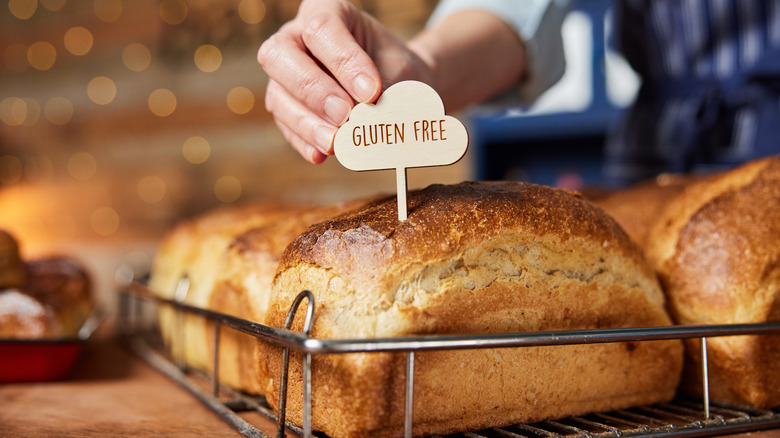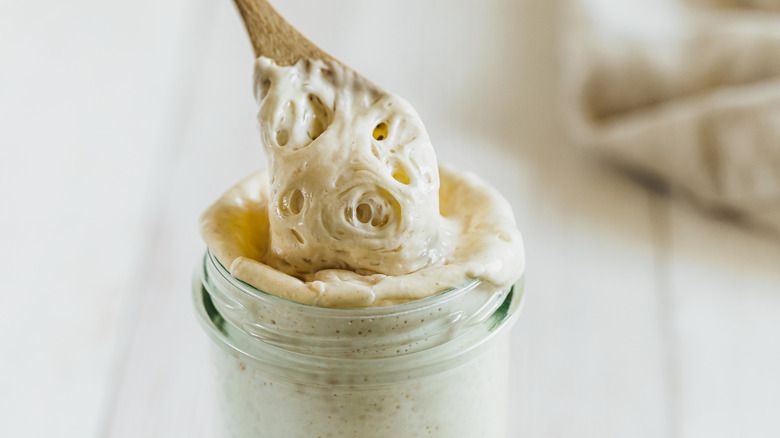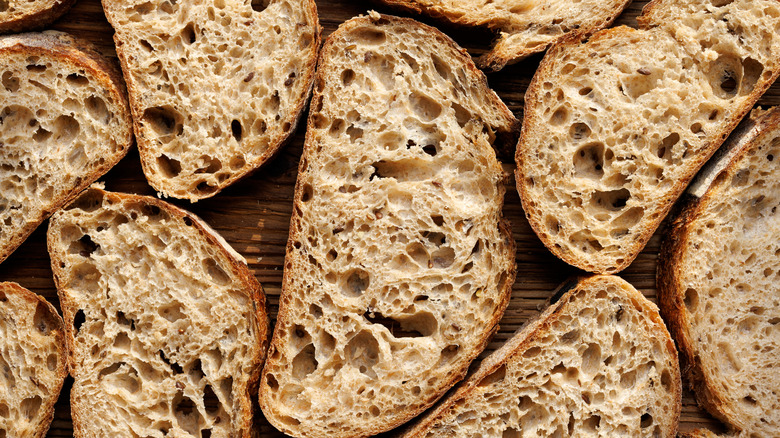Why Some With Gluten Sensitivities Can Eat Sourdough Bread
By some estimates, 20-30% of adults in the United States follow a gluten-free diet, with motivations ranging from managing a gluten-related disorder to seeking certain health benefits. Despite this trend, going gluten-free often comes with a side of FOMO — whether that's missing out on a new boxed pasta or a hot deli sandwich. With this in mind, it makes sense why people might be excited to hear that sourdough is a lower-gluten option, but interested folks would do well to read up before cutting into that loaf.
While sourdough bread is lower in gluten than other breads, it's not completely gluten-free. This means that people with Celiac disease or a strong intolerance to gluten should still avoid it. However, there is reason to believe that certain people with sensitivities can enjoy it. To understand why, we'll need a mini nutrition lesson.
Aside from being a dietary buzzword, gluten is a protein found in grains like wheat, barley, and rye, which gives bread its characteristic structure and elasticity. While most people's bellies can tolerate gluten, NIH data shows that 7% of Americans have an intolerance or sensitivity. Just 1% have Celiac disease, a more indicated condition (one that can be diagnosed with a blood test) that, without dietary changes, can damage the small intestine. Non-Celiac gluten sensitivity (NCGS) falls under the 7% umbrella, and results in discomfort when eating gluten-containing foods without meeting the diagnostic criteria for Celiac.
Fermentation affects gluten in sourdough bread
The potential magic of sourdough lies in its fermentation process. Instead of using fast-rising baker's yeast like conventional bread, sourdough relies on a starter culture that includes wild yeast and lactic acid-producing bacteria. These microorganisms partially break down proteins like gluten and carbohydrates like fructans — the key word being partially. Although fermentation reduces gluten content over time, it doesn't eliminate it. This makes wheat-based sourdough bread unsafe for those with Celiac or a gluten intolerance, as even small amounts of gluten are harmful to the intestinal wall.
So where did the belief in sourdough as a gluten-free option come from? Some may overestimate the extent to which gluten is reduced through fermentation. On the other hand, some people with NCGS report that they tolerate sourdough. This may be because they are sensitive to other components of gluten-containing foods, such proteins called ATIs (amylase/trypsin-inhibitors), or fructans, which some people with irritable bowel syndrome (IBS) react to. While this is encouraging, some may misinterpret these experiences and extrapolate them to all gluten-avoiders, which creates confusion.
Not everyone can eat sourdough bread
Researchers are continuously making strides in learning how the gut biomes of various populations react to sourdough. In one study produced by the American Society for Microbiology, scientists were able to successfully produce bread containing less than 10 parts per million (ppm) of gluten (just below the upper limit of 10-20 ppm per day for people with Celiac) that was tolerated by a small sample of Celiac patients. This is a significant reduction, as conventional bread has much higher levels, and food with the label "gluten-free" is required to be under 20 ppm. However, it should be said, that this occurred under carefully controlled lab conditions, which are extremely difficult to replicate at home or in a bakery.
In general, researchers note that most sourdough products are not safe for Celiac patients, because although gluten levels are lower than other conventional breads, they're not quite low enough. For those with Celiac or severe gluten intolerances, safe options include bread made from alternative, gluten-free flours, or homemade gluten-free sourdough starters. On the bright side, people with IBS or a sensitivity to fructans may find sourdough a friendlier option, thanks to these conditions being dose-dependent.


